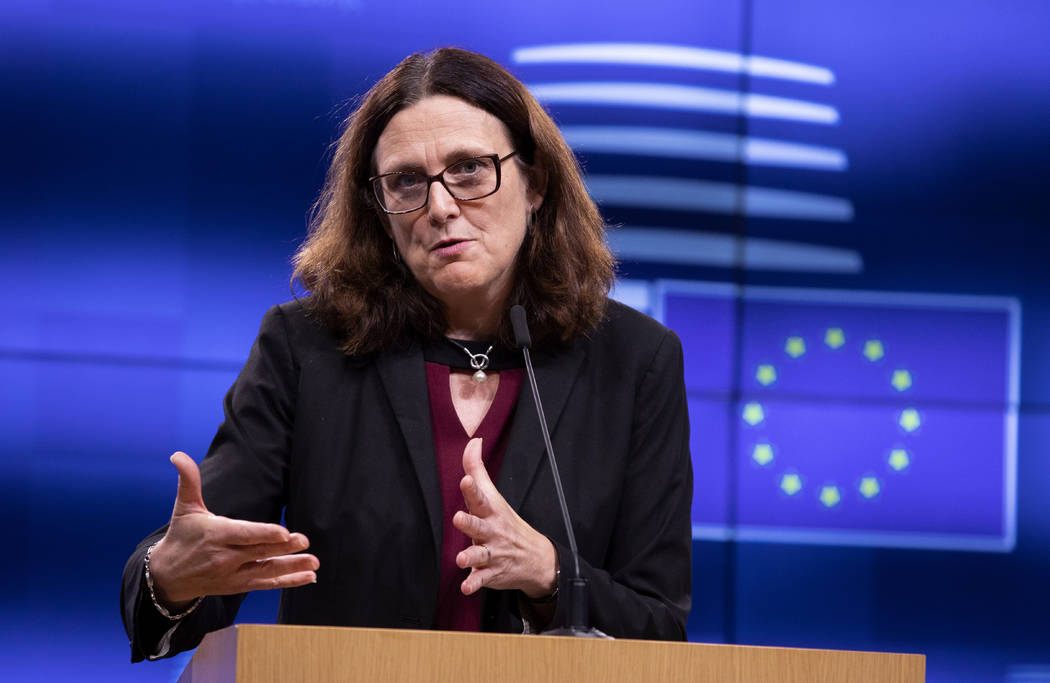US gets approval to slap $7.5B in traiffs on European Union

BRUSSELS — The World Trade Organization says the United States can impose tariffs on up to $7.5 billion worth of goods from the European Union as retaliation for illegal subsidies to European plane-maker Airbus — a record award from the trade body.
The move green-lights the Trump administration to slap countermeasures on the 28-member bloc and follows a WTO ruling in May 2018 on the Airbus subsidies.
Wednesday’s award doesn’t end the long-running trans-Atlantic dispute over aircraft: WTO arbitrators are expected to rule next year on how much the EU can impose in tariffs following a separate decision that went against Boeing.
The U.S. has already announced plans to impose tariffs on EU cheeses, olives, whiskey, as well as aircraft and aircraft parts. Wednesday’s decision may require fine-tuning of that list.
Earlier, the EU made a last-ditch appeal Wednesday to U.S. President Donald Trump to avoid any tit-for-tat tariff war as the global trade governing body prepares to issue a ruling that could allow him to impose billions in duties on EU produce.
The World Trade Organization ruled in May that Europe illegally subsidized planemaker Airbus, hurting U.S. competitor Boeing. The EU won a similar WTO case accusing the U.S. of illegally subsidizing Boeing.
The EU would have a similar right to compensate through tariffs when its own ruling comes through, but said it hopes to not have to resort to that.
Avoid tariffs
“We should avoid imposing tariffs on one another. This would be damaging to our economies, to global trade and the broader aircraft industry,” European Commission spokeswoman Mina Andreeva said.
“We are ready to work with (the U.S.) on a fair and balanced solution for our respective aircraft industries. We are still ready and willing to find a fair settlement, but if the U.S. decides to impose authorized countermeasures, the EU will do the same,” she told reporters. The commission, the EU’s powerful executive arm, runs trade negotiations on behalf of the 28 EU member countries.
Tensions rise
Trans-Atlantic trade tensions have soared since Trump slapped tariffs on European steel and aluminum last year. He said the move was to protect U.S. national security interests, but the Europeans claim it is simply protectionism and breaks global trade rules.
In response, the EU introduced “rebalancing” tariffs on about 2.8 billion euros ($3 billion) worth of U.S. steel, agricultural and other products.
Trump has also threatened to slap duties on European automakers.
In an attempt to head off a tariff war, European Commission President Jean-Claude Juncker traveled to Washington to meet Trump last year, and a rough outline of a limited trade deal on industrial products emerged. But little progress has been made, and both sides accuse each other of dragging their feet.
The U.S. envoy to Brussels, Gordon Sondland, said last month that trans-Atlantic trade talks have “not borne a lot of fruit” recently. He said that “with the current (EU) leadership we’re at somewhat of an impasse.” A new commission team is set to take office on Nov. 1.